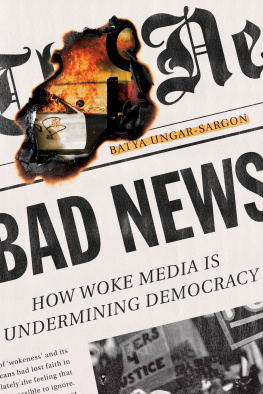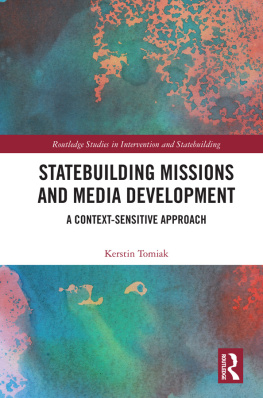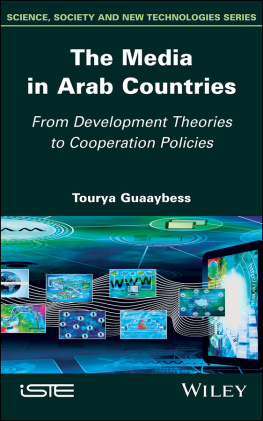Developing News
Developing News sets out to describe how development is articulated in the news and used by newspeople as an analytical category to explain the world. It is about examining development as a discourse that is based on the harmful contrast between the developed and the developing (or the underdeveloped) and that sets the boundaries for what is permissible to say.
Jairo Lugo-Ocando and An Nguyen begin by discussing the news coverage of development that emerged as a news category for newspapers and broadcasters after World War II. They move on to examine the way development has been reported by the mainstream media, exploring the rationales and ideologies that determined and continue to define the way the media think about and represent development in the news. In doing so, the authors contribute to a better understanding of the relationship between the news agenda, news sources and the development policies that are set in the centres of power.
This book is ideal for those studying and researching issues to do with journalism and the Third World. It may also be relevant for those students taking courses in global or international journalism, media and democracy, development studies or international politics. Above all, it is an invitation for journalists to rethink their own practice in representing international development and its components.
Jairo Lugo-Ocando is an Associate Professor in the School of Media and Communication at the University of Leeds in the United Kingdom. Before becoming an academic he worked as a correspondent and news editor for several media outlets in Latin America and the US.
An Nguyen an Associate Professor of Journalism in the School of Journalism, English and Communication at Bournemouth University in the United Kingdom. A former Vietnamese journalist and an Australian-educated scholar, he has published widely in several areas, including digital news consumption and citizenship, public engagement with science news, and news and socio-political changes in a globalising world.
First published 2017
by Routledge
2 Park Square, Milton Park, Abingdon, Oxon OX14 4RN
and by Routledge
711 Third Avenue, New York, NY 10017
Routledge is an imprint of the Taylor & Francis Group, an informa business
2017 Jairo Lugo-Ocando and An Nguyen; Anya Schiffrin and Audrey Ariss for : News coverage of foreign aid: a case study of the Millennium Village Project in African, US and UK media.
The right of Jairo Lugo-Ocando and An Nguyen to be identified as authors of this work has been asserted by them in accordance with sections 77 and 78 of the Copyright, Designs and Patents Act 1988.
All rights reserved. No part of this book may be reprinted or reproduced or utilised in any form or by any electronic, mechanical, or other means, now known or hereafter invented, including photocopying and recording, or in any information storage or retrieval system, without permission in writing from the publishers.
Trademark notice: Product or corporate names may be trademarks or registered trademarks, and are used only for identification and explanation without intent to infringe.
British Library Cataloguing-in-Publication Data
A catalogue record for this book is available from the British Library
Library of Congress Cataloging-in-Publication Data
Names: Lugo-Ocando, Jairo, author. | Nguyen, An, 1975 author.
Title: Developing news : global journalism and the coverage of third
world development / by Jairo Lugo-Ocando and An Nguyen.
Description: London ; New York : Routledge, 2017. | Includes
bibliographical references and index.
Identifiers: LCCN 2016036621 | ISBN 9780415621823 (hardback :
alk. paper) | ISBN 9781315269245 (ebook)
Subjects: LCSH: Developing countriesPress coverageWestern
countries.
Classification: LCC PN4784.D47 .L84 2017 | DDC 070.4/332dc23
LC record available at https://lccn.loc.gov/2016036621
ISBN: 978-0-415-62182-3 (hbk)
ISBN: 978-1-315-26924-5 (ebk)
Typeset in Sabon
by Apex CoVantage, LLC
As most works, this book is a collective effort. Let it be no doubt that any flaw or issue is entirely of our own making, but we would like to acknowledge a series of institutions and people that made possible this book. Firstly, we would want to thank the awarding committee of the Theodore C. Sorensen Research Fellowship from the John F. Kennedy library in the United States which made possible a great deal of the research that was carried out for this project. We would like to thank the University of Leeds and Bournemouth University for the resources that they spent on the research work that leads to this book. We would want to thank the publishing team at Routledge for trusting us with this project.
We would want to specially thank award-winning documentary photographer, Kai Lffelbein, for allowing us to use his pictures of children in Ghana recycling German toxic waste. Lffelbein is one of those photojournalists who manages to create that necessary connection between our own life styles in the West and the lives of those living in poverty in the Global South. Finally, a huge thank you to our families who gave us their patience while we worked on it. We dedicate this book to them as well as to our families and friends back in the Global South with the hope for a better future.
On October 15, 1880, John Rowlands better known in history as Henry Morton Stanley wrote the following in his diaries: We went to Africa uninvited, therein lies our fault. But it was not so grave that our lives [when threatened] should be forfeited (cited by Jeal, 2007: 14). These brief lines from the renowned journalist and explorer, who was perhaps known best for his rescue of David Livingstone, illustrate the vice circle that characterised the adventure of civilisation: one of semi-apologetic intervention followed by violence claiming to be self-defence. It reflects the same rationale for the interventions of the past in Congo and of the present in Iraq and Afghanistan and will probably be used again to justify others in the future. Indeed, the notion of civilisation has been used throughout history, from the ancient world to the British Empire, to legitimise conquest and expansion. It is a concept that has survived time and, since the late 1940s, gone through a metamorphosis to become a category that is widely referred to today as development.
Development, understood as the generation of social changes to allow people and societies to achieve their human potential, especially through economic growth and social progress, has been a central organising concept of the world (Naz, 2006: 64) since Harry S Truman formally established it in his inaugural presidency speech on January 20, 1949. From the ashes of World War II, the speech broke away from the shadow of the colonial past, dividing the globe into two worlds: the vast majority in the South as the underdeveloped and a handful in the North as the developed. Under this new worldview, as Wolfgang Sachs (1992) pointed out, all the peoples of the earth were to move along the same track and aspire to only one goal development. The speech was the starting gun in the race for the South to catch up with the North, presumably with the technical assistance of the North to achieve greater production as the key to peace and prosperity (Sachs, 1992). This model was clearly outlined in Trumans speech:








